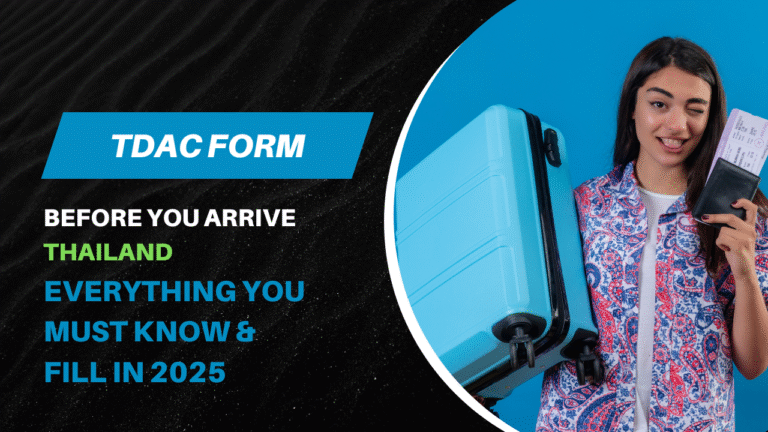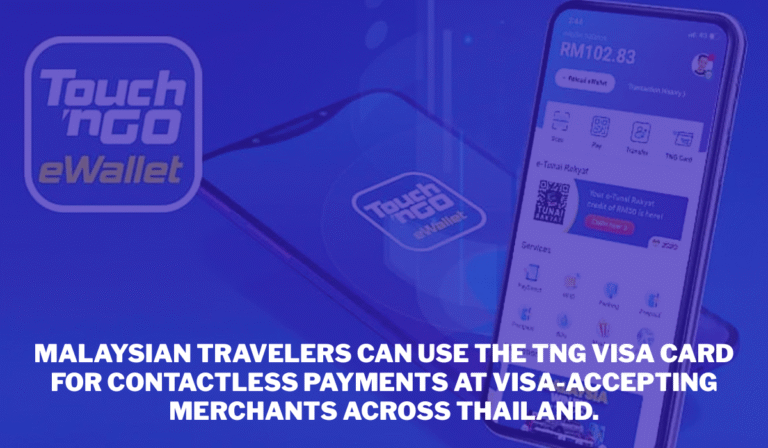Thailand Visa Rules 2025: Easy Guide for Tourists, Expats & Retirees
Traveling to Thailand is exciting, but visa questions can make things confusing. Do you need a visa, how long can you stay, and what about new rules in 2025? Many travelers and expats face these doubts.
This guide makes Thailand Visa Rules simple and easy to understand. Whether you plan a short holiday, a study program, or retirement in Thailand, here you will find clear answers to make your trip smooth and stress-free.

About Thailand Visa Rules
Thailand attracts millions every year with its beaches, culture, and affordable lifestyle. To manage visitors, the government updates Thai visa policies often.
Recent changes include easier online applications through the e-visa system, adjustments in visa exemption Thailand options, and new services for long-stay foreigners. Thailand visa service centers also help with applications, extensions, and advice.
How You Can Understand Thailand Visa Rules
The best way to manage your visa process is to break it into steps with a clear road map:
- Decide your purpose of visit — tourism, business, education, retirement, or family.
- Check if your nationality qualifies for visa exemption Thailand.
- If not exempt, apply online through the e-visa portal or at the Thai embassy or consulate.
- Prepare supporting documents upload such as passport, travel booking, funds, and insurance.
- Learn about rules for re-entry permit, 90-day reporting, and overstay penalties.
By following this roadmap, you can avoid mistakes and enjoy Thailand without visa stress.
Key Features Table
| Feature | Simple Explanation |
| E-Visa | Apply online without visiting the embassy. |
| Visa on Arrival | Get visa at the airport if your country is eligible. |
| Tourist Visa | Options for 60 or 90 days, single or multiple entry. |
| Retirement Visa | For people aged 50+ with savings or pension. |
| Education Visa | For students learning Thai or studying programs. |
| Marriage Visa | For foreign spouses of Thai citizens. |
| Non-Immigrant Visa | Covers work, business, family, and media. |
| Re-entry Permit | Lets you leave Thailand without canceling your visa. |
Overview: Thailand Visa System 2025
Thailand’s visa system has multiple categories. Key updates for 2025:
- e-visa available for most types.
- Digital arrival card replacing paper TM6.
- New Destination Thailand Visa (DTV) for remote workers.
- Stronger requirements for retirement visa including proof of pension age 50+ and medical insurance requirement.
E-Visa (Electronic Visa)
What is Thailand E-Visa
The Thailand e-visa is an online system to apply without visiting an embassy.
Supported Visa Types
Tourist visa, non-immigrant visa, retirement visa, and student visa are supported.
Step-by-Step Process
- Register on the official e-visa portal.
- Select visa type.
- Upload documents like passport, hotel booking, and funds proof.
- Pay with e-payment of visa fee.
- Download visa approval PDF.
Checklist for E-Visa
- Passport valid at least 6 months.
- Digital photos.
- Travel plan.
- Accommodation proof.
- Medical insurance for some categories.
Fees & Processing
Thailand visa fees vary by nationality. Processing time is 3–10 days.
Tourist Visas & Exemptions
Visa Exemption Scheme
Many countries get visa exemption for 30 days. Some agreements allow 60 days without a visa. Check the visa exemption list before traveling.
Tourist Visa Options
- Single entry visa validity 90 days.
- Multiple-entry tourist visa 6 months.
Applying Abroad vs Online
You can apply at embassies, consulates, or through the e-visa system.
Visa Exemption Countries Checklist
Here are the 93 countries listed below:
| # | Country |
|---|---|
| 1 | Albania |
| 2 | Andorra |
| 3 | Australia |
| 4 | Austria |
| 5 | Bahrain |
| 6 | Belgium |
| 7 | Bhutan |
| 8 | Brazil |
| 9 | Brunei |
| 10 | Bulgaria |
| 11 | Cambodia |
| 12 | Canada |
| 13 | China |
| 14 | Colombia |
| 15 | Croatia |
| 16 | Cuba |
| 17 | Cyprus |
| 18 | Czechia |
| 19 | Denmark |
| 20 | Dominica |
| 21 | Dominican Republic |
| 22 | Ecuador |
| 23 | Estonia |
| 24 | Fiji |
| 25 | Finland |
| 26 | France |
| 27 | Georgia |
| 28 | Germany |
| 29 | Greece |
| 30 | Guatemala |
| 31 | Hong Kong |
| 32 | Hungary |
| 33 | Iceland |
| 34 | India |
| 35 | Indonesia |
| 36 | Ireland |
| 37 | Israel |
| 38 | Italy |
| 39 | Jamaica |
| 40 | Japan |
| 41 | Jordan |
| 42 | Kazakhstan |
| 43 | Korea (ROK) |
| 44 | Kosovo |
| 45 | Kuwait |
| 46 | Laos |
| 47 | Latvia |
| 48 | Liechtenstein |
| 49 | Lithuania |
| 50 | Luxembourg |
| 51 | Macao |
| 52 | Malaysia |
| 53 | Maldives |
| 54 | Malta |
| 55 | Mauritius |
| 56 | Mexico |
| 57 | Monaco |
| 58 | Mongolia |
| 59 | Morocco |
| 60 | Netherlands |
| 61 | New Zealand |
| 62 | Norway |
| 63 | Oman |
| 64 | Panama |
| 65 | Papua New Guinea |
| 66 | Peru |
| 67 | Philippines |
| 68 | Poland |
| 69 | Portugal |
| 70 | Qatar |
| 71 | Romania |
| 72 | Russia |
| 73 | San Marino |
| 74 | Saudi Arabia |
| 75 | Singapore |
| 76 | Slovakia |
| 77 | Slovenia |
| 78 | Spain |
| 79 | Sri Lanka |
| 80 | South Africa |
| 81 | Sweden |
| 82 | Switzerland |
| 83 | Taiwan |
| 84 | Tonga |
| 85 | Trinidad and Tobago |
| 86 | Türkiye |
| 87 | Ukraine |
| 88 | UAE |
| 89 | UK |
| 90 | USA |
| 91 | Uruguay |
| 92 | Uzbekistan |
| 93 | Vietnam |
Destination Thailand Visa (DTV)
The Destination Thailand Visa is new for long-term visitors and digital nomads.
- Eligibility: remote workers, investors, long-stay travelers.
- Duration: 5-year multiple-entry.
- Limitations: not valid for local employment.
This supports Thailand’s goal of attracting remote workers and global talent.
Non-Immigrant Visas
Non-Immigrant B (Work)
Needed for employment in Thailand. Requires company sponsorship and work permit.
Non-Immigrant ED (Education/Student)
For studies or language programs. New ed visa rules Thailand require stronger proof of enrollment.
Non-Immigrant O (Marriage, Family, Retirement)
Covers family reunification and retirees. Popular for those applying for non immigrant O visa for family Thailand.
Non-Immigrant M (Media/Film)
For journalists, film crews, and international media.
Retirement Visa
Thailand is a popular retirement spot.
Eligibility
- Age 50 or above.
- Bank balance of 800,000 THB or monthly pension.
- Health insurance covering treatment.
2025 Updates
- New retirement visa rules Thailand from 1st March 2025 include stricter checks.
- 10 years retirement visa rules Thailand for qualified applicants.
- Options like Thailand Elite Visa and Long Term Resident Visa are alternatives.
Visa on Arrival (VoA)
Updated Country List
Available for travelers from India, China, and other listed nations. Refer to visa on arrival Thailand list of countries July 2024 and updated 2025.
Required Documents
- Passport
- Return ticket
- Hotel booking
- Proof of funds
Process at Airport
Fill visa forms PDF, pay fees, and receive a stamp.
Fees & Payments
Visa fees depend on type:
- Tourist visa ~ $40
- Non-immigrant visa ~ $80
- Visa on Arrival ~ 2000 THB
E-payment of visa fee is now widely available.
Immigration Rules & Practicalities
- 90-day reporting for all long-term visa holders.
- Re-entry permit required if you leave and plan to return.
- Visa overstay rules Thailand: daily fine, and long overstay can mean blacklisting.
- New rules to work without visa in Thailand remain illegal.
Benefits of Following Thailand Visa Rules
- Smooth entry and stay without fines.
- Access to Thai visa extensions.
- Guidance through Thailand visa service providers.
- Possible eligibility under visa exemption Thailand for short visits.
Use Cases / How & When to Apply
- Tourists: Thailand tourist visa multiple entry 60 days is ideal for island hopping.
- Students: Thailand ED visa new rules cover proper enrollment.
- Families: Marriage visa Thailand rules allow staying with Thai spouses.
- Retirees: Retirement visa rules changes Thailand make clear guidelines for pensioners.
FAQs About Thailand Visa Rules
Conclusion
Thailand remains one of the most welcoming destinations. With updated Thailand Visa Rules in 2025, travelers, expats, and retirees can find a clear path to enjoy their stay.
From short trips to long-term residence, the system offers options for every visitor. Prepare documents, follow official rules, and your journey will be smooth and stress-free.






